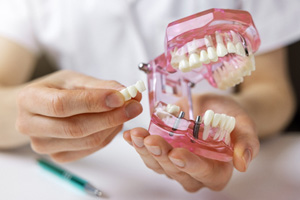
Dentures – Belmont, NH
Convenient, Cost-Effective Tooth Replacement

If you are missing one or more of your natural teeth, you may be all too familiar with the problems that those gaps in your mouth can cause. You may find it difficult to eat a balanced diet, and you might be embarrassed by the aesthetic consequences of an incomplete smile. Fortunately, modern dentistry offers a number of effective tooth replacement options, including dentures. The team at the Center for Contemporary denture is proud to provide these comfortable, natural-looking prosthetics.
Why Choose the Center for Contemporary Dentistry for Dentures?
- Natural-looking restorations
- Reliable function
- Traditional and implant-supported dentures available
What Are Dentures?

A denture is a custom-made dental prosthetic that consists of a gum-colored base that supports a row of artificial teeth. They are usually constructed out of acrylic. Full dentures replace an entire arch of lost teeth. They stay in place with the help of natural suction or a mild adhesive. A partial denture fits in around the remaining natural teeth. Small attachments help it to remain secure during eating and speaking.
Some patients opt for implant-retained dentures, which are anchored in the jawbone via prosthetic tooth roots. They tend to be much sturdier and longer-lasting than their traditional counterparts.
Who Is a Good Candidate for Dentures?

Dentures are a tried-and-true tooth replacement option that can benefit a wide variety of people, including individuals with moderate to extensive tooth loss. Of course, it is important that you attend a consultation with our team so we can examine your mouth and thoroughly consider all possible tooth replacement options. If it looks like dentures are right for you, we can move forward with planning your treatment.
Effects of Missing Teeth

Missing teeth may be the result of various factors, such as genetics, physical trauma, gum disease, decay, and certain lifestyle choices. Regardless of why you have an incomplete smile, your condition may cause numerous complications if you do not pursue tooth replacement.
For example, your remaining natural teeth may start to drift out of place, leading to a misaligned bite. You may also feel self-conscious about your appearance and shy away from social situations as a result. Additionally, it could be difficult for you to enjoy a balanced, nutritious diet.
The good news is that dentures can help to address such issues, restoring your smile’s appearance and improving its function.
What Qualifies You for Dentures?

You may benefit from a new denture if:
- You are missing multiple teeth and are looking for a cost-effective way to replace them.
- Your natural teeth have suffered significant damage due to trauma, gum disease, or decay.
- Your remaining natural teeth feel loose or you suffer from constant toothaches.
- You have an old denture that can no longer be relined (adjusted) to fit well.
- Your gums and jaw are healthy enough to support a denture.
When you visit us for your denture consultation, we will thoroughly examine your mouth and learn about your goals for your oral health. Then, we will recommend the type of tooth replacement that is the best fit for your circumstances.
Alternative Tooth Replacement Options

If dentures are not quite right for you, we may recommend an alternative form of tooth replacement, such as:
- A fixed bridge. Also known as a traditional bridge, this is a semi-permanent form of tooth replacement that relies on the remaining natural teeth for support. Bridges tend to be both sturdy and natural-looking.
- Dental implants. Dental implants are small posts that get implanted in the jawbone, where they act as prosthetic tooth roots. They can support crowns, bridges, and dentures. They are remarkably strong, have amazing benefits for jawbone health, and are considered the gold standard of tooth replacement.
Benefits of Dentures

The loss of multiple teeth can pose significant challenges. For example, you may not be able to eat all your favorite foods, and you could even suffer nutritional deficiencies. You might also miss out on the joy of social occasions due to self-consciousness about your appearance. The good news is that dentures can help with such issues! In fact, they offer a range of benefits that can enhance your overall quality of life. Continue reading below to learn how they may be able to help you.
Psychological Benefits

Edentulous people (those who are missing all their teeth) may find it difficult to accept their condition. If that is true of you, you may be all too familiar with the mental health consequences of an incomplete smile. You might tend to isolate yourself socially and miss out on the benefits of meaningful interactions. You could also have much less self-confidence than you used to, and you might hesitate to speak due to how tooth loss affects your enunciation.
Fortunately, dentures can address such problems! They can restore your smile, boost your confidence, improve your eating ability, and more. Indeed, they may help you to adopt a more positive outlook on life.
Clearer Enunciation

Clear speech is the product of interactions between several structures in your body, including your teeth. Without a full smile, you may not be able to articulate your words like you wish.
When you first get dentures, you might develop a slight lisp or have to speak a bit more slowly than usual. Once you adapt to them, though, you should be able to communicate clearly and confidently. Your enunciation should be much better than it was before you got your prosthetic.
Improves Nutrition

Many nutritious foods require some effort to chew, such as certain vegetables, fruits, and healthy proteins. When tooth loss makes it difficult to consume such items, it can lead to issues like indigestion and malnutrition. Dentures can improve your chewing ability, enabling you to enjoy a wider variety of nutritious foods. This will help your body to receive the vitamins, minerals, and calories that it needs for optimal health.
Preserves Oral Health

If you still have some of your natural teeth, dentures can benefit them in at least two ways:
- Dentures can serve as placeholders that prevent them from moving to other areas of the mouth. This can allow your bite to stay well-aligned and comfortable. It may even reduce the risk of additional tooth loss.
- Dentures can bear some of the load of regular chewing, which reduces wear and tear on your remaining teeth.
Expands Opportunity

Your smile is one of the first things that people notice about you. In job interviews, sales, and other professional situations, making a strong first impression is essential. Dentures can give you a complete, attractive, and healthy-looking smile that helps you put all your best qualities on display. In contrast, obvious poor oral health may convey the notion that you are older than you really are or that you do not take good care of yourself.
Understanding the Cost of Dentures

The cost of dentures in Belmont depends on numerous factors, including the specific type of denture you require and the materials used to make it. Our team will provide you with a candid estimate for the cost of your treatment during your consultation. We will also be happy to help you file insurance claims and explore financing options if necessary. Generally speaking, dentures are one of the most cost-effective ways to replace missing teeth.
Factors that Affect the Cost of Dentures

Some factors that have a bearing on the cost of dentures include:
- Preparatory procedures. Some patients require tooth extractions, gum disease treatment, or other services before they are eligible to receive dentures.
- The base of dentures is typically made of acrylic, while the teeth may be either acrylic or porcelain. The specific materials used can have an impact on overall price.
- The type of denture. Partial dentures, full dentures, and implant dentures come at different price points.
Keep in mind that if you come across any deals for “cheap” dentures, it is important to be cautious. Often, people who take advantage of such “bargains” are dissatisfied with the results of their treatment.
Are Implant Dentures More Expensive?

Yes, implant dentures in Belmont cost more than their traditional counterparts. They require more time, more materials, and a higher level of expertise to design and place. Despite their higher cost, they are a worthwhile purchase. They last much longer than traditional dentures, so you are getting an excellent long-term value. You can also enjoy a number of daily benefits, such as strong chewing power, a natural-feeling smile, and freedom from slippage. Plus, dental implants preserve the jawbone, which helps your face to retain its natural shape and allows you to enjoy the most youthful appearance possible.
Does Dental Insurance Cover Dentures?

Most dental insurance plans consider dentures to be a major restorative service, which means that around 50% of the treatment cost may be covered, up to the amount of a plan’s annual maximum. For many people, their insurance can take hundreds of dollars or more off the cost of their prosthetic. Our team is used to dealing with the ins and outs of insurance, so we will be happy to help you understand your policy and file all the necessary paperwork.
Other Options for Making Dentures Affordable

As your denture dentist in Belmont, we are ready to go above and beyond to help you afford treatment. To that end, we offer a few provisions:
- Essential Dental Plan. This discount plan provides reduced fees on many of the services we offer.
- Most patients are qualified for low-interest financing through CareCredit, a third-party service that specializes in helping people pay for medical and dental care over time.
- If you are interested in implant dentures, you can schedule a FREE consultation.
Get in touch with us today to learn more about dentures and their price. We look forward to serving you!
Denture FAQs

Dentures in Belmont offer a reliable and attractive way to address tooth loss. Still, before you commit to a tooth replacement consultation with our team, you may want more information about the road ahead. To help you out, we have compiled the following list of FAQs about this restorative treatment, along with brief and clear answers. If you do not see the information you were hoping for, give us a call — we will be happy to personally address any concerns you may have.
How Long Will You Have to Wait to Get Dentures After Your Teeth Are Pulled?
Most patients wait 6 – 8 weeks between extractions and denture placement. This allows the gums to heal and ensures that your prosthetic provides a snug and comfortable fit. However, some patients opt for immediate dentures, which are prepared before extractions and placed immediately after. Although they will need to be adjusted or replaced relatively soon, many patients view them as a worthwhile investment because they can allow you to avoid being toothless.
Implant dentures have a different treatment timeline. Depending on the specifics of your procedure, you may get dentures on the same day as your extractions or several months afterward.
Can I Sleep with My Dentures?
When you first get your prosthetic, your denture dentist in Belmont might recommend that you wear it continuously for the first 24 hours. After that, however, you should remove it every night. This allows the gums a chance to rest and can prevent sores. It also facilitates thorough oral hygiene; your dentures should be removed each night so you can clean them and perhaps place them in a cleansing solution. You will also have to clean your gums and the rest of your mouth to prevent bad breath and infections.
What Is the Average Age for Dentures?
Tooth loss becomes more common with age. In fact, data from the National Center for Health Statistics shows that almost 66% of adults aged 40 – 64 are missing at least one tooth, whereas just 33% of adults aged 20 – 39 have the same problem. Roughly 57% of people in the 65 – 74 age range wear some type of denture, according to data from the American Dental Association.
Of course, if you are younger, there is no shame in getting dentures. Tooth loss can occur at an early age due to many factors, such as genetics, accidents, and certain illnesses.
Is It Hard to Talk with Dentures?
Ultimately, dentures should enhance your speech and help you enunciate your words as clearly as possible. When you first get dentures, however, you can expect there to be a bit of a learning curve when it comes to speaking. Some patients notice a lisp or other changes to their speech. You can adapt to talking with your prosthetic via practice. Reading out loud and chatting with family members can do much to help you refine the way you speak. If your dentures tend to slip while you are talking, you might need to use adhesive or visit us to get them adjusted.
Will It Hurt to Get Dentures?
Some stages of the denture process may cause discomfort. For example, you might need to get some of your teeth extracted prior to receiving your prosthetic. Although the extraction procedure itself is comfortable, it can cause soreness that lasts for multiple days. Most patients feel better within a week or so.
When you first get your dentures, they might be a bit uncomfortable and could cause some gum irritation. That is completely normal. As you adjust to your prosthetic, it should become much easier to wear.
If your dentures ever cause severe pain or discomfort that lingers for an unusually long period of time, call our office to request assistance.
Can Dentures Reduce Life Expectancy?
Some research indicates that wearing dentures might decrease life expectancy by up to 10 years.
This association is likely not due to the dentures themselves. Rather, it may be related to the reduced bite force that dentures provide. Especially if your dentures do not fit well, you might gravitate toward foods that are not particularly nutrient dense. As a result, your risk of various diseases may increase.
The good news is that implant dentures provide a bite force that is almost equal to that of natural teeth. Therefore, they may help you stay healthy well into your golden years.
What Can You Not Eat with Dentures?
If you wear traditional dentures, some foods that it would be best to avoid include:
- Sticky items, such as peanut butter and gummy candies. Not only are these difficult to consume, but they might pull your dentures right off your gums!
- Foods with small pieces, such as popcorn, shelled nuts, and anything with sesame seeds. Food debris could easily get trapped beneath your dentures and irritate your gums.
- Hard foods, like whole apples, corn on the cob, and carrot sticks. These might destabilize your dentures. If you eat such items, cut them into small pieces and move them directly to the back of your mouth for chewing.
- Tough cuts of meat. These may require a lot of chewing, which may cause friction and irritation in your mouth.
Why Do My Dentures Smell Bad?
Dentures may start to smell bad due to an overabundance of bacteria and food particles. These can get trapped in the nooks and crannies of your prosthetic and cause odors over time. This issue is particularly common among individuals whose dentures do not fit well. Additionally, if you have a dry mouth, it can create an environment where it is easier for bacteria to thrive.
To keep your dentures and your mouth fresh and clean, be sure to stick to a thorough oral hygiene routine and drink plenty of water. If you have questions on how to clean either your prosthetic or your oral tissues, simply ask our team.
Can I Use Regular Toothpaste to Clean My Dentures?
It is important that you brush your dentures daily, but you should not use regular toothpaste to do so. That is because most toothpaste formulas are slightly abrasive. That is fine for natural teeth, but unfortunately, such toothpastes might scratch your dentures, causing them to lose their beautiful appearance. Instead, use a mild, clear soap or products that are specifically designed to be used on dentures.